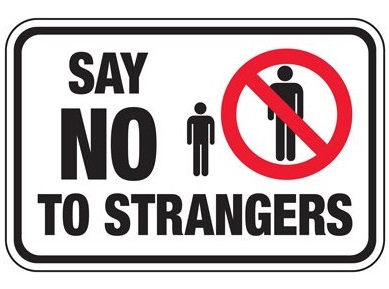Stranger Danger
(This page is designed for our children to access – please signpost your child towards this page)
A stranger can be described as someone who we don’t know or someone who we don’t know well. Most people are kind but there are a small number of people who might not be. We cannot tell who is kind just by looking at them. We must never go anywhere with a stranger or do anything for a stranger. It doesn’t matter what they say to us, we should always tell the grown-ups who look after us if a stranger talks to us.

Why is it important?
Stranger danger is taught and embedded regularly at our school. With lots of adults working at St Bart’s and many visitors (pre-covid), you all have the opportunity to practise recognising strangers or familiar people every day. This also applies when ‘out and about’ in the community or on our walks around the village and to the church. Stranger Danger is not just about learning who or what to avoid but includes positive rules so that you know how to keep yourselves safe. Remember to:
• know who you can trust if you need help (eg a uniformed police officer or a teacher)
• have the confidence to trust your instincts if you have a bad feeling
• be aware of your surroundings
• learn to be assertive
• know that you should tell a trusted adult if you have been approached by a stranger
Stranger danger rules
• never go anywhere with a stranger
• never accept gifts or sweets from a stranger
• never get in a car with a stranger
• never go off on your own without telling your parents or a trusted adult
• it is okay to break the rules if you are in danger
• shout, kick, scream or run away if you feel you are in danger
Stranger danger video
The video below is designed to highlight a few key points regarding stranger danger. Please watch and listen carefully to the information that is shared.
https://www.youtube.com/watch?v=H95m0v2sIMY&feature=youtu.be
Parent Information
We would advise you to talk to your child about who their safe adults are and where their safe places are incase help is ever needed. It’s also important to think about safety on the internet and use of mobile phone apps and games that have ‘chat’ functions as this can be just as dangerous as a stranger in the street (please see the e-safety section for more information regarding this topic).
